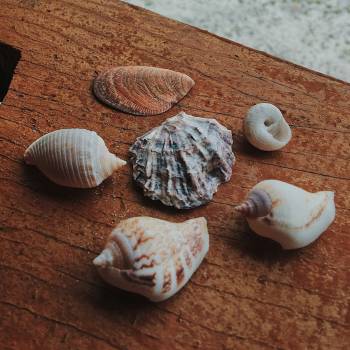The first Muslim رضي الله عنها .
The first martyr رضي الله عنها .
The haven of his heart رضي الله عنهاwho Rasulullah ﷺ ran to after experiencing Revelation for the first time.
The one رضي الله عنهاwho could make the Messenger ﷺ laugh like no other.
The person رضي الله عنها who resembled the Prophet ﷺ in appearance and mannerisms the most.
The beautiful soul رضي الله عنهاwho allowed the “orphan who adopted humanity ﷺ” to feel like a beloved son.
These were all women.
(If you can guess who these incredible 6 are, drop a comment below!)
Let’s delve into snapshots of four remarkable sahabi (female companions) and try to extract life lessons that are actionable within our own hyped and busy lifestyles.
The pure noblewoman
“She believed in me when no one else did; she accepted Islam when people rejected me; and she helped and comforted me when there was no one else to lend me a helping hand.”
[Ibn Abd al-Barr, Al-Isti'ab]
In a culture where polygamy wasn’t just a norm but it was expected, why did the Prophet ﷺ not even think of taking another wife while married to Khadija رضي الله عنها ?
The answer is simple; She was everything he needed in his lifeﷺ.
Khadijaرضي الله عنها was a woman ahead of her time, running a business empire, the princess of the Quraysh, but still so dignified and modest that she was nicknamed as At-Tahirah (The Pure One). She tirelessly supported Rasulullah ﷺ in every way imaginable, both before and after Prophethood, welcomed his family into her home and his message into her heart.
She رضي الله عنه is one half of the four women who perfected their faith because she gave birth to and raised the fourth- Fathima رضي الله عنها !
It was she who held Rasulullah ﷺ together during the most trying moment of his life, when he questioned his sanity, eloquently listing all his beautiful attributes that Allah would never disgrace. Until the day of his death, Rasulullah ﷺ never failed to mention her with love and longing.
There is an ocean of pearls to obtain from this noble lady’s رضي الله عنهاexample, but one that is particularly relevant to our times is how Khadija رضي الله عنها knew what she wanted, setting standards of excellence for herself and others.
In a society that was so corrupt that the Prophet ﷺ had to meditate upon its follies in a mountain cave, Khadija رضي الله عنه remained a shining star, untouchable by the widespread immorality and uninfluenced by a dishonest and capitalist culture. She refused even the most eligible men of Mecca (after her husband passed away) because their character was not up to par with her expectations.
She told the Prophet ﷺ that it wasn’t his radiant beauty or noble lineage that drew her to him, but rather, his upstanding character and honest conduct [See References].
Therefore, first, we must align our priorities with what Allah سُبْحَانَهُ وَتَعَالَى wants for us, and never compromise on them, upholding our principles with grace and dignity regardless of our challenging circumstances.
The compassionate scholar
“And the superiority of `Aisha to other women is like the superiority of Tharid (a nutritious dish) to other kinds of food.”
[Al-Bukhari 5418]
This profound simile was used by the Prophet ﷺ to convey the wholesomeness of her رضي الله عنها piety that was only second to the four women who perfected their faith (Aisha, Maryam, Khadija, and Fatimah عليه السلام].
She is our deep insight into how Rasulullah ﷺ was at home, how he was the last to start an argument and the first to end it (yes, the last Messenger ﷺ had to face marital tiffs), and how he did household chores and repaired his clothes despite being the leader of a nation!
There is even an adorable and funny narration about how, when she used to miss the Prophet ﷺ during his i'tikaf (seclusion in the masjid), he would silently stick his head into the house so that she could comb his hair! [ Bukhari, Book 33, No.246]
As Imam Omar Suleiman mentions in his lecture series about the Mothers of the Believers, she recited the following beautiful verse about the Prophet ﷺ:
“If those who condemned Zulaikha cut their hands when they saw Yusuf عليه السلام, had they seen the smile of the Prophetﷺ, they would have cut out their hearts.”
She was a muftiah (authorized to give fatwa), specialized in both Islamic and ‘secular’ sciences, from the Law of Inheritance and in-depth hadith explanations to medicine, poetry, and tracing lineage. But she was also one who sat with and advocated for those marginalized by society, from homeless and convicted women to those faced with abuse [see references].
But what many of us often don’t register about this brilliant woman رضي الله عنهاis her expansive heart that nurtured those around her intellectually, physically, and emotionally.
Following the pattern of her noble father and sister رضي, الله عنه her generosity was astounding. Her beloved nephew Urwah ibn Zubair رضي الله عنه (who studied under her) narrated,
“Aisha, may Allah be pleased with her, would give seventy thousand coins in charity while her clothes were covered in patches.” [al-Zuhd wal-Raqā’iq 754]
Finally, when the wives of the Prophet ﷺ were given the choice to leave their poor living conditions without being considered sinful, she led the beautiful campaign of,
“I want Allah and His Messenger ﷺ and Paradise.”
There are endless lessons we can take from the life of our beautiful, witty, and soft-hearted Mother Aisha, but one that stands out is to expand our hearts to embrace all people, no matter how sophisticated or qualified we are or how much we think we know. We need to use our gifts to bring kindness and humanity back to the world, seeking to meet Allah سُبْحَانَهُ وَتَعَالَى when He is pleased with us.
The motherly strategist
“We belong to Allah and to Him shall we return; O Allah, reward me for my affliction and give me something better than it in exchange for it.”
[Sahih Muslim 918]
This beautiful du’a taught to us by Rasulullah ﷺ was in response to the grief faced by Umm Salamahرضي الله عنها and, as we will see, Allah kept His promise and gave her something better than what she lost.
All of Rasulullah’s ﷺ marriages served a unique purpose and taught this ummah (nation) a multitude of lessons on how to deal with various marital circumstances in the most beautiful of ways.
Umm Salamah was an older lady who had been through a lot, and after she lost her righteous husband, Abu Salamahرضي الله عنه , the Prophet ﷺ himself proposed marriage to her and promised to care for her children like his own.
Umm Salamah رضي الله عنه had been brought up in luxury and had elegant tastes and manners, however, it’s noteworthy that she got on excellently with Rasulullah ﷺ, because despite his extremely simple lifestyle, our Messenger had an exemplary character and deep refinement.
She was also extremely intelligent and wise, as evidenced by the famous incident at Hudaibiyyah when she advised the Prophet ﷺ (who asked for her counsel) to rouse the sahaba out of their grief and frustration by exhibiting what he had instructed them to do and not speaking a word. And it worked! [Sahih al-Bukhari 2731, 2732]
But what I want us to marvel at was this amazing lady’s tawakkul in Allah during her darkest moments, which translated into her du’as being answered in the most wondrous ways.
The first instance was when she was violently prevented from migrating to Medina with her beloved (first) husband, and her little son Salamah رضي الله عنه was injured in the process. Despite constant heartache, she made du’a for relief each day for a whole year, and SubhanAllah, Allah sent her help in the form of a non-believer she didn’t even know! [see references]
After her joyous reunion with her family in Medina, calamity struck when Abu Salamah died from a battle wound. Again, this steadfast lady kept supplicating for him and reciting the du’a (mentioned above) that Rasulullah ﷺ had taught her. She had never in a million years wanted to marry anyone else, refusing two of the greatest companions, Abu Bakr and Umar رضي الله عنه when they proposed. Allah planned that she would go on to marry the best of Mankind ﷺ, the only one who could treat her better than her first love.
SubhanAllah, we should never despair in turning to Allah سُبْحَانَهُ وَتَعَالَى, no one can help us like our Lord, An-Naseer!
The fearless advocator
“I saw myself (in a dream) entering Paradise, and behold! I saw Ar-Rumaisa’ (Umm Sulaym) Abu Talha’s wife.”
(Bukhari 3679)
Our last righteous Sahabi, Umm Sulaym رضي الله عنه, was from the Ansar (helpers of Medina) and the mother of the notable companion Anas Ibn Malik رضي الله عنه, who served the Prophet ﷺ from his boyhood and loved him dearly. After her husband abandoned her when she asserted her Islam, she married the very wealthy sahaba, Abu Talha رضي الله عنه, and they became a power couple for the Deen!
Now, while there are many unique things about Umm Sulaym رضي الله عنها , like her asking Abu Talha for the dowry of his accepting Islam, travelling for expeditions with the Prophet ﷺ while pregnant, and having good expectations of Allah even during the devastation of losing a child [see references], I’d like to focus on just one outstanding aspect of her personality.
She advocated for people in her community who lacked a voice, even though she had many children and led a busy, knowledge-seeking lifestyle. She had an orphan girl under her care whom she was protective over, and one day, it was the Prophet ﷺ himself who inadvertently roused this protectiveness!
Once, upon seeing the girl, Rasulullah ﷺ was so surprised at her growth, that he said, “O it is you, you have grown! May you not advance in years!”
[ Sahih Muslim 2603]
Of course, he was expressing the affectionate sentiment of ‘stay little, you’re growing too fast’, but the girl was alarmed that she would never grow again and ran to her adoptive mother in tears!
Umm Sulaymرضي الله عنها wasted no time in rushing to the Prophet ﷺ and questioned him about what he said, and he set her heart at ease.
This is a remarkable thing, how many of us would rush in defense of a small child’s feelings when it involves someone of great respect and position?
This teaches us not to belittle anyone’s worries or problems and to stand up for every troubled member of the community no matter who they are.
Some takeaway jewels
All five of these women were from the best people to walk the face of the earth, many of them guaranteed Jannah in their lifetime by Allah through His noble Messenger ﷺ.
Yet, if we observe their stories, they are painted in so much struggle and sacrifice.
This teaches us that Allah tests whom He loves, and the best of us are those who respond in a way that pleases Him and makes us sources of inspiration to others for many generations to come.
Also, these amazing companions weren’t restricted to just one role, they embodied a multitude of interests, specialties, and skills that the Prophet ﷺ did not just approve of, but he also empowered in his beautiful way.
Women were mothers, homemakers, fighters, professionals, and scholars from the time of the Sahaba, and it was when they were restricted in pursuing knowledge (for example, after the 10th Century AH) that we experienced a decline of the religiously enlightened.
Who do you think nurtured the best scholars of this Ummah?
But the most successful of them followed the comprehensive guidelines set by Allah سُبْحَانَهُ وَتَعَالَى and His Messengerﷺ.
There is no Deen (religion, way of life) that protects and validates women like Islam, empowering them at every juncture of their lives, proactively ensuring that no one could harm or debase them physically, emotionally, or spiritually.
And I’d like to end on a gem dropped by Ustadah Taimiyyah Zubair:
“Never underestimate the influence you can have (and do have) as a woman. When you spend time learning, especially sacred knowledge, you’re not the only one benefitting.”
References:
Marriage of Khadija رضي الله عنها to Rasulullah ﷺ : The Firsts, a lecture series by Yaqeen Insitiute, titled: Khadija (Ra): His First Love, Our First Mother ( https://www.youtube.com/watch?v=gRBTQKlfC78)
Hadith of Aisha رضي الله عنها and the homeless woman: Bukhari 430
Hadith of Aisha رضي الله عنها and the woman claiming to be abused: Bukhari 5825
Story of Umm Salamah and Umm Sulaym رضي الله عنها : Men & Women Around The Messenger; Khaalid Muhammad Khaalid, Dr. Abdel Hamid Eliwa, trans. Sheikh Muhammad Mustafa Gemeiah (etc.), Dar Al-Manarah Islamic Publishing House, 2003, pages 543-547 & pages 624-628. (Free download at Kalahmullah.com)
 Maryam Hamza
Maryam Hamza 







Aida Masuri Mustafa
Maryam Hamza